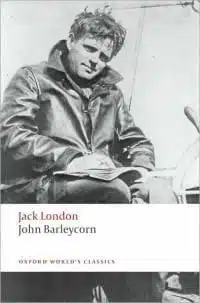
Putting aside obvious selections like Charles R. Jackson’s The Lost Weekend, Malcolm Lowry’s harrowing Under the Volcano, or essentially anything written by Charles Bukowski, we present here a list of nine indispensible rye-saturated ruminations on the life of the rummy. Do not show up at your next AA meeting with any of these titles in your hip pocket because the vapors wafting from the pages will send everyone in the room falling off the wagon … hard.
The Assault on Tony’s by John O’Brien
Yeah, yeah, yeah, Ben Sanderson drinks himself into the tomb in O’Brien’s debut novel, Leaving Las Vegas, but in this posthumous release from 1996, five hopeless booze hounds holed up in a bar during an apocalyptic riot show just what a hapless wimp ol’ Ben was. This startling novel is a fascinating blend of Eugene O’Neill’s stark drama The Iceman Cometh and a Twilight Zone episode that could scare anyone straight into sobriety.
Big Sur by Jack Kerouac
Burnt out by the demands of fame and the unwanted King of the Beatnicks appellation, Jack Kerouac takes refuge in the coastal cabin of publisher and City Lights Books owner Lawrence Ferlinghetti (presented here as Lorenz Monsanto) in Big Sur, California. Jack thinks he can kick the sauce. Jack thinks twice about that fanciful notion when the DTs come-a-callin’ in full, living color. This is the book that Stephen King thought he was writing with The Shining.
John Barleycorn by Jack London
You know that quaint concept about alcoholics in denial? Jack wrote 300 pages on the topic in 1913 before the term was ever coined. “You have shown yourself no alcoholic,” Jack’s dutiful wife Charmian proclaims in the opening chapter, “no dipsomaniac, but merely an habitual drinker, one who has made John Barleycorn’s acquaintance by rubbing shoulders with him. Write it up and call it Alcoholic Memoirs.” And he did; a sometimes-rollicking Barbary Coast drinking history written by a man who denies having a drinking problem. The concept alone is more humorous and hypocritical than Glenn Beck writing a book on civility in public discourse.
Miss Lonelyhearts by Nathanael West
Dragged into and destroyed by the sordidness of the pathetic lives he is brought into contact with through his daily advice column, a newspaper reporter goes off the deep end and spends a lot of time at Delahanty’s speakeasy plotting his martyrdom after he has made the required stop at the seven Stations of the Cross. Much has been made over the decades about the obvious and sometimes over-the-top Christ symbolism in West’s outstanding novella but very few extracts have been composed around the fact that most of the book’s events unfold either in an alcoholic stupor or through the head-crushing punishment of a hangover.
Tortilla Flat by John Steinbeck
In this quaint novel of Monterey, the Nobel Prize winning author writes of the close-knit community of paisanos, “a mixture of Spanish, Indian, Mexican, and assorted Caucasian bloods … that lived in an uphill district above the town called Tortilla Flat” … of course, Danny and his fellow paisanos can rarely actually see the town below because their vision is blurred by the gallons of deep red wine they are perpetually scheming to procure. A close cousin to another booze-soaked Steinbeck novella, Cannery Row, but infused with a larger zest for life.
The Long Goodbye by Raymond Chandler
“The first time I laid eyes on Terry Lennox he was drunk …” So begins Chandler’s sixth Philip Marlowe novel and, without a doubt, not only the best book in the series that forever cemented the literary concept of the hard-boiled LA detective but perhaps one of the best American novels of the 20th Century. Chandler’s two main clients in this bleak and breathtaking noir adventure are hopeless lushes: the wife murderer Terry Lennox and the Malcolm Lowry-like novelist Roger Wade who falls victim to blackmail and a quack doctor with a dry-out clinic. Marlowe’s drinking looks positively abstentious when stood up next to these guys.
Tender is the Night by F. Scott Fitzgerald
The last novel Fitzgerald would see published in his lifetime is also the only novel in which he honestly grapples with the ghosts of booze land. Set in Europe during the interwar years, Scott tells the story of brilliant American psychologist Dick Diver and his wealthy and emotionally unstable wife, Nicole (sound like a particular couple we know?). There are lover’s quarrels, quaint expatriate celebrations throughout the European continent, and enough free-flowing champagne in the first chapter alone to give anyone a contact buzz. More mature and troubling than The Great Gatsby but unfocused at times due to the fact that Fitzgerald was dipping his own beak quite a bit during construction of the complex novel.
Northline by Willy Vlautin
Young Allison Johnson flees Las Vegas and her abusive skinhead boyfriend for a better life in Reno. Ha! Good luck with that, Allison, what with your tendency toward blackout drinking binges and those long conversations you have with your imaginary best friend, film star Paul Newman. A stark, powerful, and touching contemporary novel about the sometimes elusive search for self-belief in a physical landscape as desolate as the inner lives of Vlautin’s well-rendered and believable characters.
The Thirsty Muse: Alcohol and the American Writer by Tom Dardis
Of the seven native-born Americans awarded the Nobel Prize in literature, English prof Dardis writes in the introduction to this 1989 work, five were alcoholic. Dardis argues convincingly that the romantic concept of the alcoholic writer is a uniquely American contrivance and proves it through an examination of the drinking lives of Fitzgerald, Hemingway, Faulkner, and O’Neill — the latter being the only writer in the group whose creativity surged when he finally gave up the bottle.
